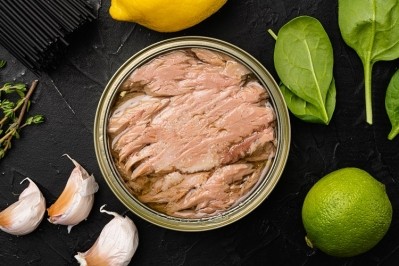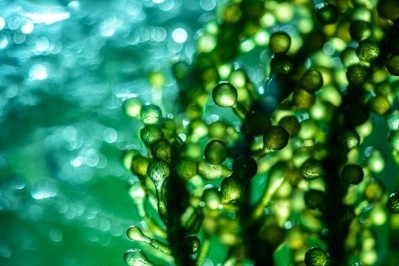‘Microalgae could be cultivated on Mars’: Experts detail less obvious benefits of algae production

By 2050, it is estimated global populations will reach around 9.8bn. With so many mouths to feed, and an agri-food system that accounts for one-quarter of total greenhouse gas (GHG) emissions, entrepreneurs are on the hunt for food sources that champion both human and planetary health.
An increasing number believe they have found it in algae. Some in macroalgae (or seaweed), and others in microalgae, which unlikely the former, is largely invisible to the eye.
Algae cultivation has some very obvious sustainability benefits, particularly concerning its reliance – or lack there for – on limited natural resources. When grown in the ocean, it does not require any fresh water and is not in competition with landbound crops. It is also cultivated without inputs such as fertiliser or pesticide.
And when microalgae are grown in tanks on land, reliance on natural resources is minimal compared to conventional livestock rearing or crop cultivation.
But there are more sustainability benefits that may be less obvious to the general consumer, suggested entrepreneurs at ProVeg Incubator and Zinitinus’ Future Food Series event last week.
Producing algae-based protein on Mars
For one, microalgae needn’t be cultivated near the oceans at all. In fact, cultivation systems can be installed in some of the most unlikely places around the planet…and even further afield.
What VP at the European Algae Biomass Association Alexandra Mosch finds particularly ‘cool’ about microalgae production, is that it can grow in closed photobioreactors (PBRs) or open ponds in non-arable areas, such as deserts.
“This means they can also be grown in buildings or on rooftops, or be integrated like…vertical farms,” Mosch, who is also an advisory board member at algae supplier Allmicroalgae, told delegates. This could also prove beneficial in terms of food miles, she suggested, since that the majority of people around the world now live in cities.
Given the adaptability of microalgae production systems, it could even be conceived that microalgae-based foods be produced in some of the most desolate landscapes, suggested Eugene Wang, CEO of Singapore-based Sophie’s BioNutrients.
The start-up, which is in the process of expanding its presence in the Netherlands, ferments microalgae in bioreactors, isolates their proteins, and transforms them into a powder for food formulation.
“It may happen that when Elon Musk wants to shoot people over to Mars, we can potentially set up our technology…system on Mars – identical to the one that we’re going to set up in Europe – and produce protein out of microalgae.
“Why? Because where there is water, there is going to be microalgae,” he explained. “And we can use the microalgae on that planet to [create] food for the new settlers on that new planet.
“This may be too extreme [a concept] for a lot of folks, but I’m just trying to point out the fact that you don’t really have to be affected by global warming or the weather, and you don’t need a lot of space. You can just use fermentation technology.”
How can algae address nitrification?
Another advantage of algae production, is that when managed correctly, it has the potential to reduce the impact of challenging environmental problems.
Nitrogen and phosphorous pollution is one such issue, with human activities – including excessive fertiliser use in conventional farming – largely to blame.
As nitrogen and phosphorous in the water encourage algae to grow, water systems can quickly become overrun, resulting in algal blooms. Algal blooms can be toxic, and have been known to kill fish, mammals and birds.
But is there a way for nitrogen and phosphorous pollution to be leveraged for good? Tel Aviv University spin-off Genesea, which is making protein isolates and other ingredients for plant-based food manufacture from offshore marine macroalgae, is investigating a solution.
“We need nitrogen for seaweed to grow,” explained co-founder Alex Golberg. “So one of the first things we did, a few years ago, was to create a global map of locations where there are…both natural nutrients coming up from the bottom of the ocean to the surface, and nutrification – where…fertilisers wash off from agriculture to the sea.”
These are areas Genesea predicts could prove fertile for seaweed farming.
Golberg also stressed the relevance of ocean currents. “We knew that any type of nutrient that you put [in the sea] will immediately disperse somewhere else. So you need to locate the farm in an area where the current [transports] the nutrient supply.”

In a similar vein, Jacob von Manteuffel, co-founder of German brands BettaF!sh and Nordic Oceanfruit – which both use ocean-cultivated seaweed in their food products – sees this as a ‘huge opportunity’ to close the cycle.
“A large amount of the phosphates and nitrates that we put into our agricultural systems end up in the ocean and it’s a huge waste of resources. It has some very bad impacts on our ecosystem in the ocean, and by cultivating seaweed, we have the possibility to close the cycle and gain back nutrients we really can’t afford to lose right now.”
Do we need to make seaweed cultivation more sustainable?
There is some concern that ocean-cultivated algae will not be the silver bullet many hope it will be. Growing seaweed can, indeed, create environmental problems in the oceans when high density cultivation causes biomass degradation and methane production.
“It can actually convert into a big swamp in the middle of the ocean. This could happen,” said Genesea’s Golberg.
However, there are ‘a lot’ of projects underway, by the European Union and others, to explore how seaweed can be grown in a sure-fire environmentally friendly way. “Meaning that there will be enough light available to all other organisms that live here.”
One solution could be to build cases that allow sufficient amounts of light into the ocean, the co-founder continued. “All these are real problems that exist, and the communities are aware of them and the solutions are coming.”
Is seaweed farming at risk of significantly harming the environment in this way anytime soon? BettaF!sh and Nordic Oceanfruit’s von Manteuffel is not convinced.
“We are destroying our oceans globally, taking people’s resources by massive fishing fleets…and then we calculate if seaweed farming could at some point speculatively have a negative impact. That’s hypocrisy…
“Seaweed farming is very small still and there is huge potential. It’s far from being harmful…”

































